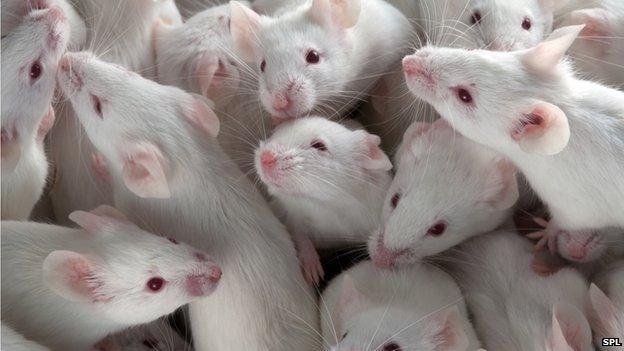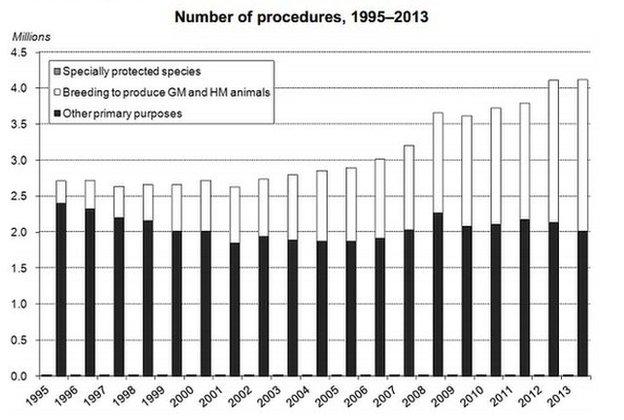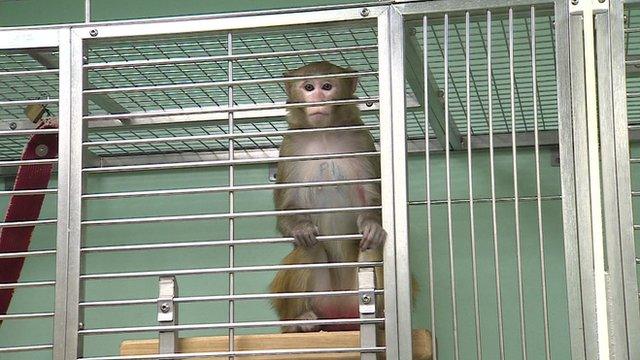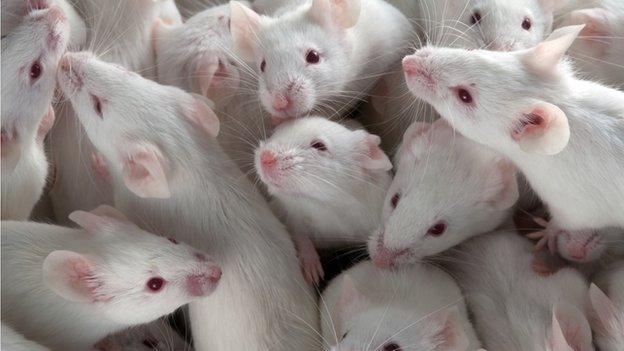Minister Norman Baker wants end to UK animal tests
- Published

The minister in charge of regulating animal experiments in the UK has said he wants to see an end to all testing.
Lib Dem MP Norman Baker - a longstanding anti-vivisection campaigner - said a ban on animal testing "would not happen tomorrow".
But he claimed the government was moving in the right direction.
The coalition is committed to reducing the number of live animal experiments - but animal rights campaigners say they have broken that promise.
Mr Baker, who as crime prevention minister at the Home Office has responsibility for regulating the use of animals in science, said he was trying to persuade the industry to accept the economic case for ending tests.
"I am firmly of the belief it is not simply a moral issue but that we as a nation can get a strategic advantage from this - something that will be good for the economy," Mr Baker told BBC News.
"I have been encouraging the industry to come up with alternatives to animal testing."
'Privacy clause'
The scientific community says research on live animals is vital to understanding disease and has resulted in new vaccines and also treatments for cancer, Parkinson's disease, asthma and HIV - but opponents say it is cruel and pointless, as alternative research methods are available.
Mr Baker has also promised legislation before the next election to increase transparency - potentially giving the public the chance to obtain details about what happens to animals in laboratories.
At the moment, the Home Office blocks requests for data on research contracts and the justification for using live animals as the issue is exempt from the Freedom of Information Act.

Researchers are protected by a "privacy clause" in Section 24 of the Animals (Scientific Procedures) Act 1986.
Mr Baker has carried out a review of the Section 24 following a high profile campaign by the National Anti-Vivisection Society and celebrities including Joanna Lumley and Eddie Izzard.
In a statement, Mr Baker said: "The coalition government is committed to enhancing openness and transparency about the use of animals in scientific research to improve public understanding of this work. It is also a personal priority of mine.
"The consultation on Section 24 of the Animals in Science Act has now concluded and we are currently analysing responses in preparation for pursuing potential legislative change."
The number of experiments on animals in the UK increased by 52% between 1995 and 2013, according to official statistics. , external
Latest figure show show 4.12 million procedures were carried out with animals in 2013, a rise of 0.3% on the previous year.
'Suffer and die'
There was a 6% increase in breeding genetically modified animals and a 5% decrease in other procedures.
Mice, fish and rats were the most commonly used species in 2013, with 3.08 million procedures carried out on them.

The rise in the total number of procedures was 0.03% between 2012 and 2013
There was an increase in testing of guinea pigs (+13,602); sheep (+2,919); rabbits (+1,233); pigs (+350); gerbils (+279); monkeys (+216) and reptiles (+183).
But there was a fall in experiments on birds (-13,259); amphibians (-3,338); cattle (-1,167); goats (-969) and hamsters (-354).
British Union for the Abolition of Vivisection chief executive Michelle Thew said: 'We continue to be disappointed that the government has failed to deliver on its 2010 pledge to reduce animal experiments and to end the use of animals to test household products.
"Millions of animals continue to suffer and die in our laboratories.
"The UK should be leading the way in reducing animal testing, yet we remain one of the world's largest users of animals in experiments and the numbers continue to rise.
"We have, however, been encouraged by recent statements from Home Office Minister, Norman Baker, that increased transparency regarding animal experiments will be dealt with within this Parliament."
But Chris Magee, of the Understanding Animal Research campaign, expressed reservations about Mr Baker's call for an end to testing.
He said: "I think we all agree that alternatives should be developed and used wherever possible, and it should be noted that more than 15,000 fewer animals were used in 2013 than 2012. It is already against the law to use an animal for research if there's an alternative method available.
"We should also be clear that it is illegal to test cosmetics or their ingredients on animals. Experiments are for medical, scientific, veterinary and environmental research, and over half of experiments are the breeding of genetically altered animals, mainly mice.
"We have long argued for increased funding for developing alternatives and reform of Section 24, however a hurdle to the minister's vision may be that a great deal of research is about discovering how biological systems work in the first place. You cannot simulate the unknown."
- Published31 July 2014

- Published10 July 2014
.jpg)
- Published7 February 2014

- Published14 March 2012